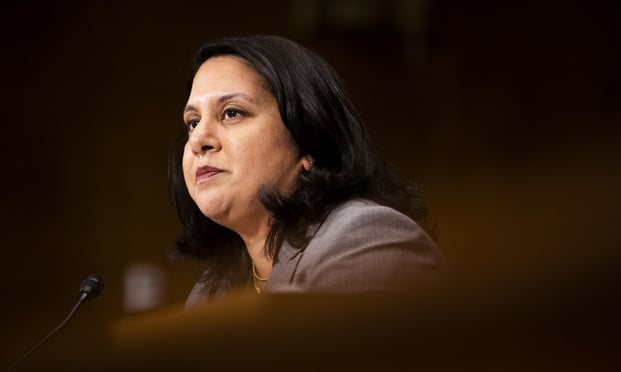Trump Appointee Neomi Rao Has Some Strong Opinions. Even Her GOP-Tapped Colleague Disagrees.
Rao has written multiple lengthy dissents against the House's lawsuits, and fellow judges are chiding her over the arguments.
March 11, 2020 at 11:15 AM
7 minute read
 Neomi Rao testifies before the Senate Judiciary Committee during her confirmation hearing to be U.S. Circuit Judge for the District of Columbia Circuit, on Feb. 5, 2019. (Photo: Diego M. Radzinschi/ALM)
Neomi Rao testifies before the Senate Judiciary Committee during her confirmation hearing to be U.S. Circuit Judge for the District of Columbia Circuit, on Feb. 5, 2019. (Photo: Diego M. Radzinschi/ALM)
One year into her tenure on the U.S. Court of Appeals for the D.C. Circuit, Judge Neomi Rao has found herself at the heart of crucial rulings on the U.S. House's oversight powers—on the dissenting side.
Rao was the dissenting judge in the court's October ruling that upheld the House Oversight and Reform Committee's subpoena for President Donald Trump's tax documents from Mazars. She was also one of three judges who would have granted an en banc rehearing of that case. Then on Tuesday, she again penned a dissent, this time in the House Judiciary Committee's application to get grand jury materials redacted from special counsel Robert Mueller's report.
A Trump appointee, Rao has found her arguments knocked by colleagues from both sides of the aisle: By a Clinton appointee in Mazars (an Obama appointee joined that opinion) and in the grand jury case by both Bush and Clinton appointees.
Rao wrote that the D.C. Circuit's recent ruling on former White House counsel Don McGahn's testimony, which found the House Judiciary Committee did not have Article III standing to bring forward the suit, meant the committee also could not ask the court to compel the Justice Department to hand over the grand jury information redacted from special counsel Robert Mueller III's report.
She said there were two different components to the House getting the grand jury materials: The court had to not only authorize the release but also then compel the Justice Department to provide them.
That second stage, Rao wrote, triggered Article III authorities for the court that foreclosed the committee from seeking judicial review.
"Here, the district court's order to DOJ for disclosure of the grand jury materials required an exercise of Article III power, because nothing in the grand jury context alters the court's power in relation to the executive branch," Rao wrote. "Suspending the standing requirements of Article III in this context would constitute an exception to justiciability not supported by the Constitution, Rule 6(e), or the general supervisory power over grand juries."
She also wrote that she believed Chief District Judge Beryl Howell "did not abuse [her] discretion" in initially ruling for the release of the materials, as the impeachment trial against President Donald Trump had not yet taken place.
However, Rao found, after the Senate acquitted Trump last month, "remand is necessary for the district court to address whether authorization is still warranted."
She also suggested the case could be moot altogether with the end of the impeachment trial, writing that the panel's majority "simply turns a blind eye to these very public events and the parties have not submitted any additional briefs."
"Yet, because I conclude that the Committee lacks standing for compulsory process, mootness is irrelevant: The district court lacked jurisdiction at the outset to compel DOJ to release the grand jury materials," Rao wrote.
It's not uncommon for judges authoring a court's majority or concurring opinion to address arguments made in dissenting opinion. On Tuesday, Judge Thomas Griffith—who wrote the majority opinion on McGahn—released a concurring opinion aimed solely at countering claims raised by Rao.
"Unlike McGahn, this case does not involve a suit between the political branches over executive-branch documents or testimony. Instead, it involves an application for access to records of the grand jury, whose disclosure the district court has traditionally controlled," he wrote.
Griffith wrote that Rao's claim that possession of the documents is "dispositive" in determining the case, "elevates form over substance." And he said the dissent's "distinction between authorization and compulsion strikes me as untenable on its own terms."
"Finally, although I agree with the dissent that we have an independent obligation to assure ourselves of our jurisdiction, we need not chase jurisdictional phantoms," Griffith added.
Judge Judith Rogers also briefly touched on Rao's dissent in the court's majority opinion, writing that the "distinction that our dissenting colleague reads into the district court's order between authorizing and ordering release is not raised by either party and rests on a flawed premise."
"Our colleague assumes that the House of Representatives is seeking compulsory judicial action against the executive branch," Rogers wrote. "Because the Department of Justice is simply the custodian of the grand jury materials at issue however, the instant case is unlike inter-branch disputes where Congress issued subpoenas and directed executive branch officials to testify and produce their relevant documents."
Tuesday wasn't the first time a fellow judge has criticized Rao over her approach to one of the House lawsuits. In her dissenting opinion over the Mazars subpoena, Rao said lawmakers should have to start an impeachment inquiry in order to obtain information about a sitting president that could prove damaging, rather than using their legislative authorities.
"The most important question is not whether Congress has put forth some legitimate legislative purpose, but rather whether Congress is investigating suspicions of criminality or allegations that the President violated a law. Such investigations may be pursued exclusively through impeachment," Rao wrote. "The House may not use the legislative power to circumvent the protections and accountability that accompany the impeachment power."
In the court's majority opinion for that case, Judge David Tatel said Rao's argument "would reorder the very structure of the Constitution."
"The dissent's approach would not even allow Congress to make the quintessentially legislative judgment that some concerns about potential misconduct or illegality are better addressed through oversight and legislation than impeachment," Tatel wrote. "Worse still, the dissent's novel approach would now impose upon the courts the job of ordering the cessation of the legislative function and putting Congress to the Hobson's Choice of impeachment or nothing."
Tuesday's Mueller grand jury ruling is all but certain to be posed to the full D.C. Circuit, if the Justice Department seeks an en banc rehearing of the case. Rao will then get a chance to weigh in again on it.
But she is unlikely to be able to express her viewpoint on another major House lawsuit currently at the D.C. Circuit, the one on McGahn's testimony. Prior filings in that case suggest that both Rao and fellow circuit Judge Gregory Katsas are recused from the matter, as Trump appointed both to the bench after they served in his administration in roles in which they would have interacted with McGahn.
That will leave just two Republican-appointed active judges on the circuit as part of the decision on whether to rehear the McGahn case.
Read more:
House Can Get Secret Grand Jury Information in Mueller Report, DC Circuit Rules
Warning of Dramatic 'Upset' of Constitutional Powers, US House Asks Full DC Circuit to Rehear McGahn
DC Circuit Throws Out Lawsuit for Don McGahn's Testimony, in Major Loss for House
This content has been archived. It is available through our partners, LexisNexis® and Bloomberg Law.
To view this content, please continue to their sites.
Not a Lexis Subscriber?
Subscribe Now
Not a Bloomberg Law Subscriber?
Subscribe Now
NOT FOR REPRINT
© 2025 ALM Global, LLC, All Rights Reserved. Request academic re-use from www.copyright.com. All other uses, submit a request to [email protected]. For more information visit Asset & Logo Licensing.
You Might Like
View All
Lavish 'Lies' Led to Investors Being Fleeced in Nine-Figure International Crypto Scam
3 minute read
SEC Puts Beat Down on Ex-Wrestling CEO Vince McMahon for Not Reporting Settlements
3 minute read
DOJ Files Antitrust Suit to Block Amex GBT's Acquisition of Competitor
Trending Stories
- 1Case Advances Against Atlanta Judge
- 2Reflections on the Changing Legal Profession Upon 40 Years in Practice
- 3The Growing Antitrust Scrutiny of DraftKings and FanDuel
- 4Does Your Corporate Compliance Program Reasonably Prevent Fraud? New UK Guidance Demands It
- 5Apple GC’s Compensation Flat Again in 2024, but She Might Snag No. 1 Spot on Top-Paid List Anyway
Who Got The Work
Michael G. Bongiorno, Andrew Scott Dulberg and Elizabeth E. Driscoll from Wilmer Cutler Pickering Hale and Dorr have stepped in to represent Symbotic Inc., an A.I.-enabled technology platform that focuses on increasing supply chain efficiency, and other defendants in a pending shareholder derivative lawsuit. The case, filed Oct. 2 in Massachusetts District Court by the Brown Law Firm on behalf of Stephen Austen, accuses certain officers and directors of misleading investors in regard to Symbotic's potential for margin growth by failing to disclose that the company was not equipped to timely deploy its systems or manage expenses through project delays. The case, assigned to U.S. District Judge Nathaniel M. Gorton, is 1:24-cv-12522, Austen v. Cohen et al.
Who Got The Work
Edmund Polubinski and Marie Killmond of Davis Polk & Wardwell have entered appearances for data platform software development company MongoDB and other defendants in a pending shareholder derivative lawsuit. The action, filed Oct. 7 in New York Southern District Court by the Brown Law Firm, accuses the company's directors and/or officers of falsely expressing confidence in the company’s restructuring of its sales incentive plan and downplaying the severity of decreases in its upfront commitments. The case is 1:24-cv-07594, Roy v. Ittycheria et al.
Who Got The Work
Amy O. Bruchs and Kurt F. Ellison of Michael Best & Friedrich have entered appearances for Epic Systems Corp. in a pending employment discrimination lawsuit. The suit was filed Sept. 7 in Wisconsin Western District Court by Levine Eisberner LLC and Siri & Glimstad on behalf of a project manager who claims that he was wrongfully terminated after applying for a religious exemption to the defendant's COVID-19 vaccine mandate. The case, assigned to U.S. Magistrate Judge Anita Marie Boor, is 3:24-cv-00630, Secker, Nathan v. Epic Systems Corporation.
Who Got The Work
David X. Sullivan, Thomas J. Finn and Gregory A. Hall from McCarter & English have entered appearances for Sunrun Installation Services in a pending civil rights lawsuit. The complaint was filed Sept. 4 in Connecticut District Court by attorney Robert M. Berke on behalf of former employee George Edward Steins, who was arrested and charged with employing an unregistered home improvement salesperson. The complaint alleges that had Sunrun informed the Connecticut Department of Consumer Protection that the plaintiff's employment had ended in 2017 and that he no longer held Sunrun's home improvement contractor license, he would not have been hit with charges, which were dismissed in May 2024. The case, assigned to U.S. District Judge Jeffrey A. Meyer, is 3:24-cv-01423, Steins v. Sunrun, Inc. et al.
Who Got The Work
Greenberg Traurig shareholder Joshua L. Raskin has entered an appearance for boohoo.com UK Ltd. in a pending patent infringement lawsuit. The suit, filed Sept. 3 in Texas Eastern District Court by Rozier Hardt McDonough on behalf of Alto Dynamics, asserts five patents related to an online shopping platform. The case, assigned to U.S. District Judge Rodney Gilstrap, is 2:24-cv-00719, Alto Dynamics, LLC v. boohoo.com UK Limited.
Featured Firms
Law Offices of Gary Martin Hays & Associates, P.C.
(470) 294-1674
Law Offices of Mark E. Salomone
(857) 444-6468
Smith & Hassler
(713) 739-1250











